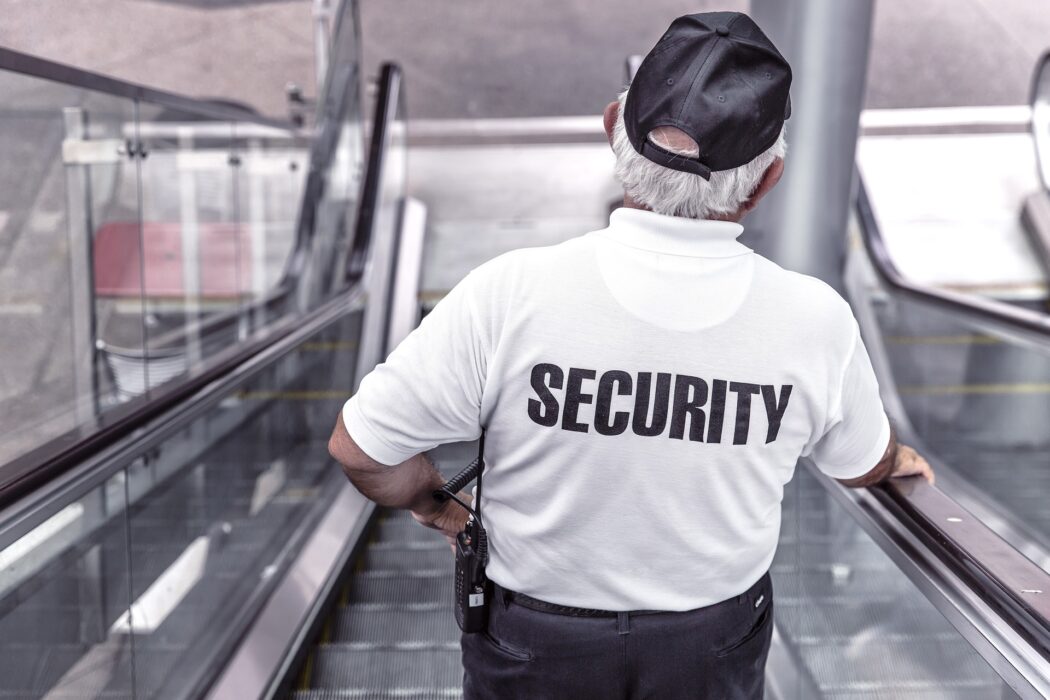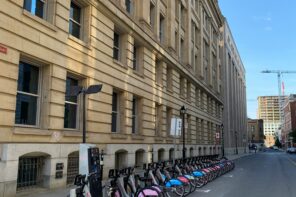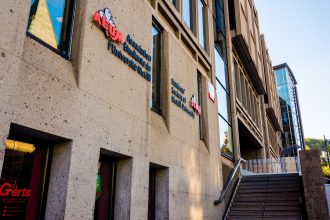In a seminar class a few weeks ago, we discussed the new policies McGill has implemented since the dismantlement of the Palestinian Solidarity encampment last spring: chaining Roddick Gates after hours, keeping campus dim after dark, and a stronger security presence on campus. As a first-year student, some measures completely flew over my head; I hadn’t realized that there were no street lights after dark, for example. Other measures stood out to me a little more: at the start of the semester, as I was leaving McLennan library from a late night study session with a friend, a security guard had to unwrap a chain from the gates in order for us to leave. I couldn’t believe that a literal chain had been put on the gates to limit access to campus. Unbeknownst to me then, that wasn’t even the most alarming measure of “safety” being implemented—the undercover security guards were.
Unbeknownst to me then, that wasn’t even the most alarming measure of “safety” being implemented—the undercover security guards were.
The undercover guards are difficult to spot on campus as they don’t wear uniforms and can only be identified by the earpieces that they wear. They are hired by McGill through a private investigation company called Groupe Sirco—the same company that, along with other police and security groups, took down the encampment on McGill’s lower field last spring. Groupe Sirco has led numerous administrative investigations at the municipal, provincial, and national levels, combating issues ranging from counterfeiting networks to narcotics trafficking to offshore fraud. Their services are divided into four main categories: investigations, protection, consulting, and prevention, making them a versatile and all-encompassing firm when it comes to addressing security concerns. Group Sirco is grounded in the pillars of integrity, rigor, and confidentiality, as stated in its company profile. Given the wide-ranging services and highly qualified workers the company offers, they can cater to most security concerns and have strong commitments to their clients so much so that they “stop at nothing to achieve your goals”—as per their website.
I wanted to better understand the role of Groupe Sirco guards on campus. How many are there? What is their primary responsibility? How do they differ from the uniformed guards? I began my research by searching “McGill and Groupe Sirco” on Google, which only gave me results about their role in the encampment’s dismantlement. Over the summer, McGill hired Groupe Sirco to conduct investigations into the encampment and later contributed to its removal. Other than Sirco’s relation to the encampment there was no other information on their role on campus. I then sent a request to the McGill Secretariat to read the contract between Groupe Sirco and McGill University which was, unsurprisingly, rejected. As a last attempt, I called Security Services and they told me that they weren’t “sure” if they could tell me about Sirco and instead they told me to send Security Services an email, for which I have yet to receive a reply.
For a university to achieve its overarching goal of the advancement and promotion of knowledge, there are bilateral obligations between the students and the university that have to be upheld. The responsibilities of students to universities are academic integrity, engagement in the community, adherence to university values, and financial obligations. On the other hand, the responsibilities of universities to students are quality education, adequate support, safety, opportunities for growth, and transparency.
While writing this article, I’ve realized the lack of transparency that there is from McGill with students in terms of what is happening on the campus. The most the administration has done to notify students of changes in security practices was informing via emails sent to the McGill community that they would “increase the presence of security staff near the encampment and elsewhere on campus” in response to the SPHR summer program in June and provide “increased security presence on campus during orientation” in mid-August; Neither of these communications referenced the long term changes in security that have since been implemented. Even if that were the case, simply stating “increased security presence” is not nearly enough of a disclaimer to ensure that students are informed of a completely new type of surveillance on campus.
Though this is a seemingly obvious breach of power, under what pretext are we supposed to hold these guards accountable for not wearing their armbands when we don’t know anything about what they can and can’t do?
Ethical surveillance consists of defined and legitimate purpose, transparency, informed consent, proportionality, and accountability. Both Groupe Sirco and McGill’s lack of transparency with its students compromises Groupe Sirco’s ability to engage in ethical surveillance. By not even making public that the company is present on campus they are unable both to be transparent with the people under surveillance and to obtain informed consent. Moreover, there is hardly a mechanism for accountability when we are unaware of what the undercover guards are hired to do and their limitations. Groupe Sirco security guards used to wear orange armbands, in addition to their earpieces, which made them identifiable to the public, but have since stopped wearing the armbands. Though this is a seemingly obvious breach of power, under what pretext are we supposed to hold these guards accountable for not wearing their armbands when we don’t know anything about what they can and can’t do? Even beyond an ethical standpoint, as students we are also customers of the university and deserve to know where the tuition fees we pay are being spent. As an institution that has been consistently underfunded since the 60s, how much is being spent on Groupe Sirco that could otherwise be used for under-resourced services on campus?
McGill’s lack of transparency with its students has created an environment of discomfort and unease amongst the minority of students who are aware of the presence of Groupe Sirco and for the most part—and arguably more concerningly—left many students in the dark about who they are being surveilled by. While the administration has decided that hiring undercover guards was necessary for the welfare of students and creating a safer campus—which is in itself debatable—, it should not be done at the expense of student’s right to knowledge and transparency and the obligations the university has to the students as part of the bilateral obligations between both groups. The discrepancies in knowledge between the students and the university creates a dangerous precedent where, by purposefully engaging in information asymmetry, the university creates an environment of mistrust, inherently reduced accountability, and sets up barriers to properly informed decision-making.








